Brazil oil auction: Lone bid wins exploration rights
- Published
Riot police were out in force ahead of the auction, as Wyre Davies reports
The rights to explore Brazil's biggest oilfield have been won at an auction by a consortium led by Brazil's state-run Petrobras, backed by Total, Shell and Chinese firms.
The group made the only bid in the auction, offering the minimum share of the surplus production.
The Rio de Janeiro beachfront hotel, where the auction took place, was guarded by 1,100 security personnel.
Earlier, striking oil workers opposed to the contest clashed with police.
Eleven companies had expressed interest in the Libra oilfield, but the Spanish Repsol pulled out on Monday, leaving the five winners as the only ones to present a bid.
'No frustration'
Chinese state companies CNPC and CNOOC offered 10% each, while the French oil giant Total and the Anglo-Dutch Shell held another 20% stake each.
Despite the lack of other offers, Mines and Energy Minister Edison Lobao told reporters he was "not one bit frustrated" by the contest having been won by the lowest possible bid.
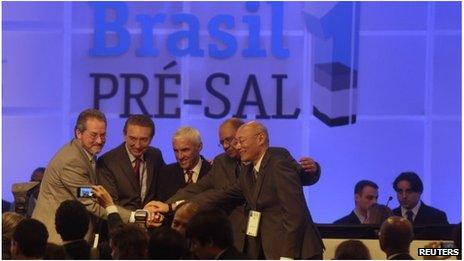
Brazil's Mines and Energy Minister Edison Lobao (second left), celebrates with representatives of the winning consortium
The president of the government's National Petroleum Agency, Magda Chambriard, called the auction an "absolute success".
"It is hard to imagine a more successful outcome. These companies are among the world's 10 most valuable in the energy branch," she said.
Petrobras offered a 10% stake on top of the 30% it was already entitled to according to the auctioning rules.
The consortium secured the rights to explore the Libra's estimated 8-12 billion barrels of recoverable oil reserves for 35 years.
Heavy security has been in place around the hotel in the western Rio district Barra da Tijuca since Sunday.
But violence broke out on Monday morning, as protesters tried to invade the cordoned area close to the hotel.
Security officers fired rubber bullets, tear gas and pepper bombs at protesters who threw stones and used corrugated iron sheets as shields.
The clashes were watched by a crowd spending the public holiday on Barra da Tijuca beach.
"There were bizarre scenes. Riot police firing tear gas and stun grenades, not just against protesters, but also on to the beach, with hundreds of tourists and sun worshippers looking on incredulously," the BBC's Wyre Davies reports from Rio de Janeiro.
Several protesters were injured.
President Dilma Rousseff had ordered tight security after violent demonstrations in Rio last week.
Among the protesters are members of various unions representing oil workers, who have been on strike since Thursday at more than 40 oil platforms and refineries.
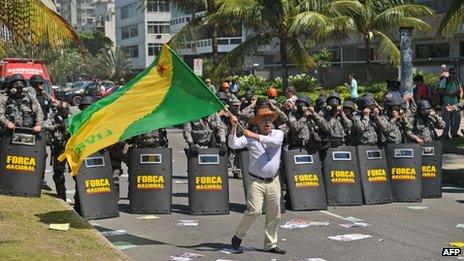
The site of the Libra auction is well guarded
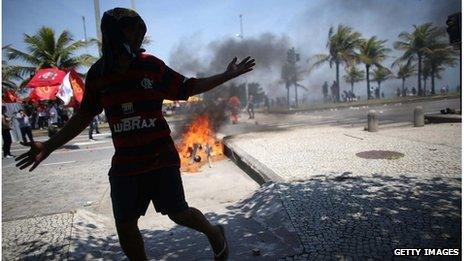
Protesters set fire to rubbish bins and overturned the car of a local broadcaster
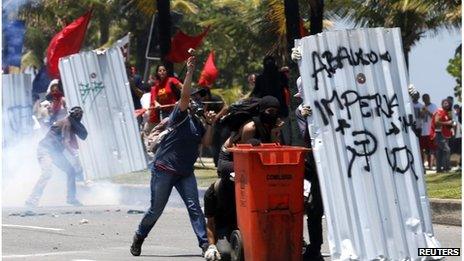
A small group of protesters used corrugated iron sheets as shields
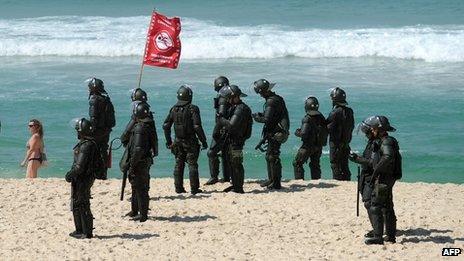
Part of the beach was blocked off to prevent protesters from accessing the area
The unions accuse the government of "selling off" Brazil's riches.
Others argued that the rules set by the government for the auction allowed too much state intervention, scaring off big players such as BP and Exxon.
The Libra field belongs to the Brazilian government's National Petroleum Agency (ANP) and is part of huge oil reserves discovered in 2010.
The offshore oilfield is located at a depth of some 5,000m (16,500ft), below a thick layer of rock, sand and salt, which makes its exploration extremely challenging.
The discovery potentially doubles Brazil's known oil reserves.
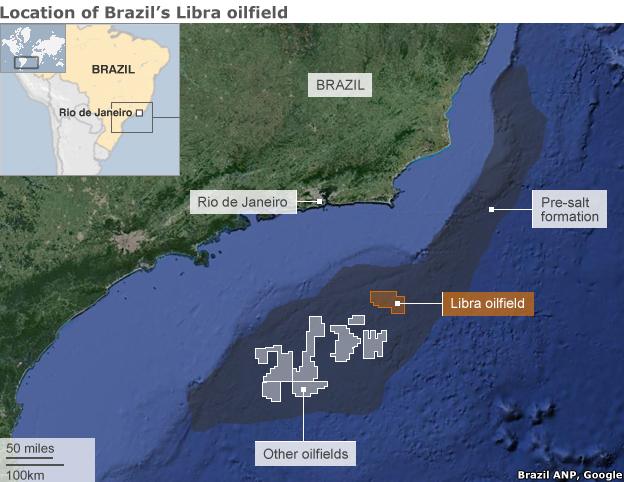
- Published21 October 2013
- Published18 October 2013
- Published3 August 2012
- Published30 October 2010